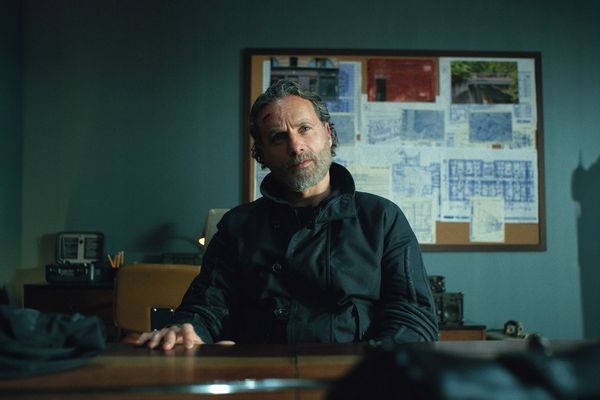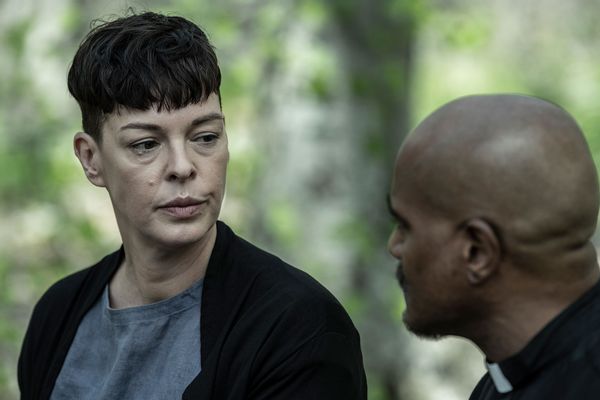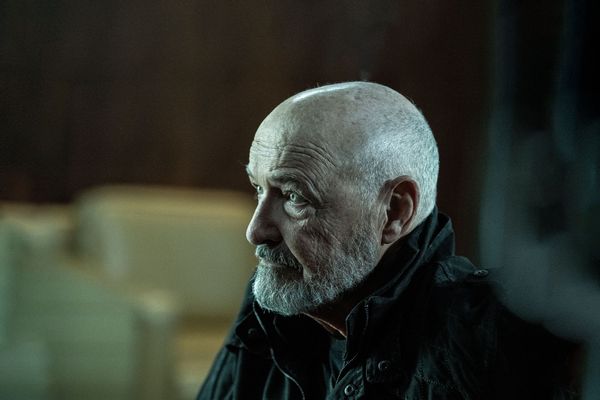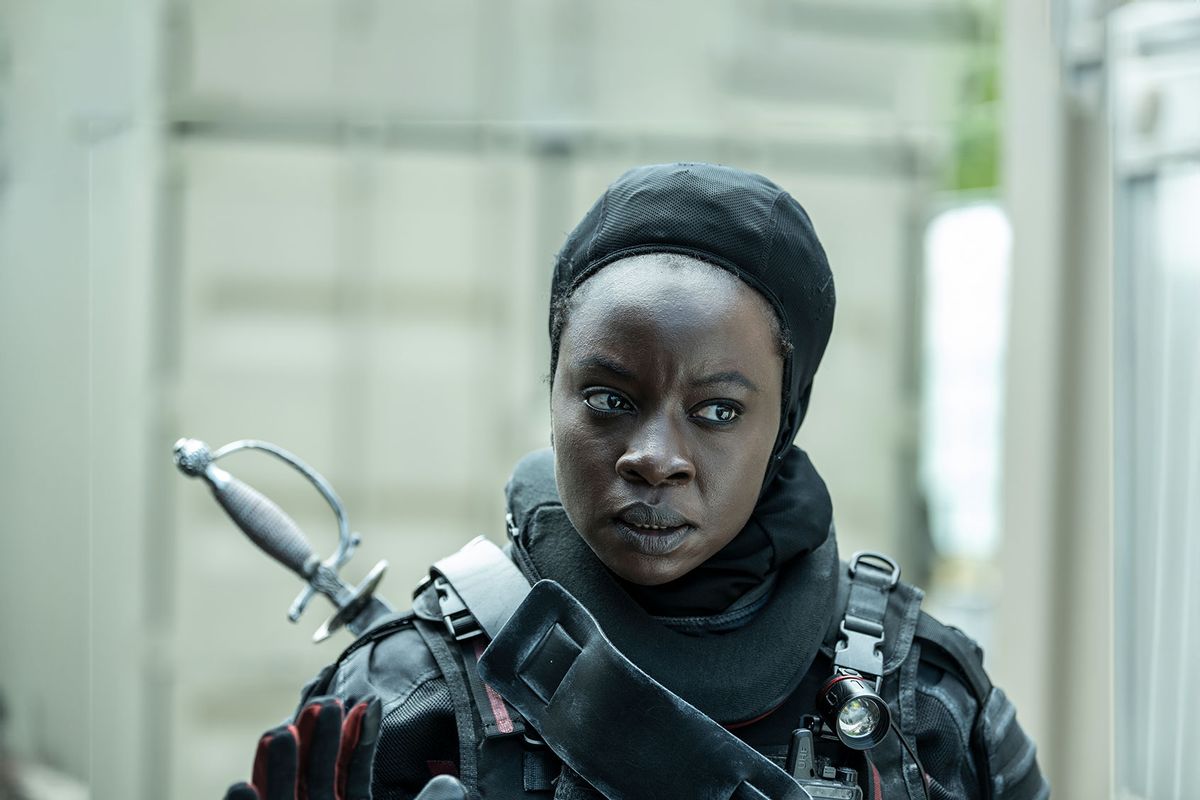Inevitable endings don’t necessarily negate our enjoyment of them, and the culmination of “The Walking Dead: The Ones Who Live” proves that. From the moment Michonne (Danai Gurira) set out to find Rick (Andrew Lincoln) we knew they’d reunite and mow down anyone who got in their way, living or dead.
Less predictable was how quickly they’d fell this universe’s largest foe, the Civic Republic Military, and those who stood for it. Jadis (Pollyanna McIntosh) had it coming after years of needling Rick and threatening his family. But when Michonne spelled out the plan for taking down the CRM to her as she lay dying, that mission sounded as if it would take at least another season of this spinoff. Turns out they only had to chop the head off the snake.
Besides, showrunner Scott Gimple was only promised six episodes and not necessarily a tomorrow. Therefore, like Lieutenant Col. Donald Okafor (Craig Tate) and Nat (Matthew August Jeffers) before him, we primarily came to know the intimidating General Beale (Terry O’Quinn) by reputation as opposed to screen time.
At the CRM’s Cascade base where Rick surrendered, per his and Michonne’s plan, Beale efficiently spelled out the secretive Echelon briefing, which amounted to a justification for destroying Portland, the only other surviving city that's under the impression the CRM is its ally.
 Andrew Lincoln on "The Walking Dead: The Ones Who Live" (AMC)
Andrew Lincoln on "The Walking Dead: The Ones Who Live" (AMC)
The soldiers would save a small percentage of Portland's children and its commanders would lie to Philadelphia’s citizens about what happened. Beale shares a few very assured-sounding statistics with Rick concerning humanity’s low survivability to justify his actions, explaining that it comes down to numbers.
While this is happening, Michonne has infiltrated a presentation where an officer is informing the shock troops about the plan already underway in Portland.
From the moment Michonne set out to find Rick, we knew they’d reunite and mow down anyone who got in their way, living or dead.
After they'd killed everyone in Portland the military would dissolve the civilian government in Philadelphia and assume control. “The stakes are too high for freedom,” he tells Rick before oiling up his ego by implying that he sees him as the potential face of this supposedly benevolent version of martial law.
For a moment it looks like Rick is on the verge of buying in. Not for long, since the sword Beale places in front of Rick, on which he’s to swear his loyalty, is soon in Michonne's hands after he kills Beale. (Quite the wedding gift!) Rick and Michonne meet up in a tent full of chlorine gas tanks, mask up, and rig a zombiefied Beale and another nameless dead soldier to make them explode after they've escaped.
Alas, they're delayed by Rick's former CRM buddy Pearl (Lesley-Ann Brandt) just long enough to have a knock-down, drag-out faceoff that ends with a grudge match between her and Michonne.
The “Ones Who Live” finale is an economically paced action movie whose narrative amounts to the heroes and villains delivering morality-defining lines when they're not throwing punches. “We will burn things to bring things back,” Beale says, later intoning, “The sword that kills is the sword that brings life.”
“In a dead world, love is dead,” Pearl hisses to Michonne, only to be defeated as Michonne says the line that should be on this show's poster: “Love doesn’t die.”
It was always going to end this way because, like Rick and Michonne tell each other, “This is the s**t we do.” Both Philadelphia and Alexandria are saved. The Grimeses get home to their kids. “The End”? Gimple hopes not, but the franchise’s chief content officer takes nothing for granted. He recognizes there are stories yet to be told and acknowledges hearing fans’ complaints about not getting enough time with Okafor, Nat or other characters.
In this season-closing conversation, Gimple addressed the challenge of telling a long-anticipated love story in six episodes, closing the book on a few significant characters, whether we’ll see more of Rick and Michonne’s story and the surprising origin story of one of the worst haircuts on TV.
The following interview has been edited for length and clarity.
When we spoke before, you mentioned that the way that people connect with characters has changed. There are two major characters that a lot of people got to know after "The Walking Dead." One is Jadis, who was in the main series as Anne, but then came back in “World Beyond.” And then Beale, who generated a lot of excitement because of the mystery surrounding him, which increased with the casting of Terry O’Quinn. You had six episodes to tell this story, and you brought in these characters, introduced Beale, and then brought their stories to an end by the finale. Can you talk about that decision?
I mean, these six episodes, which, by the way, six episodes felt incredibly constraining. For somebody who has made 80 episodes of “The Walking Dead” in a row, as a showrunner, and then even more in my position of Chief Content Officer, six episodes felt like, “Whoa, how do you do that?” But I felt that on [“Daryl Dixon,”] I felt that on “Dead City.”
What would your ideal number of episodes be?
I'm not sure. I mean, it's a different world now. You and I were talking about that. It's a different world now. I didn't really have any numbers in it. And even before that, it was a series of movies. But still, you can't even count on a series of movies. It was a movie and hopefully things go great.
We did want to make it a very complete “beginning, middle, and end” entertainment. And though I think there might be a lot of different sort of dangling story avenues to investigate, it wasn't the kind of thing where there was going to be a post-credits sequence of like, “Hey, and then this happens.” We wanted to make it a very, very complete journey for the characters and the audience. And to that end, the finality of those characters, the finality of many characters through this story was part of that.
I was gratified and horrified at how much the audience loved some of the characters we had and were angry about losing them after an episode. I was proud that they liked them that much. And I felt bad that I was putting them through it so much, but it's critical that those characters be resonant, and that Okafor affected Rick so deeply to set him on the path that he was on, and that Nat and Bailey and Aiden affect Michonne so deeply and set her on the path that she was on. And those are divergent paths. But yeah, it was all about making it a complete single entertainment.
Were you surprised at the reaction people had at seeing Jadis return? I mean, I know people reacted to her haircut.
Yeah. Well, I did too.
 Pollyanna McIntosh and Seth Gilliam in "The Walking Dead: The Ones Who Live" (AMC)Let's talk about that a little bit. Why that choice?
Pollyanna McIntosh and Seth Gilliam in "The Walking Dead: The Ones Who Live" (AMC)Let's talk about that a little bit. Why that choice?
The haircut? Oh, I can tell you very easily. OK, I think I'm giving you a haircut history. I think Pollyanna basically had the Jadis haircut for a reason when she initially auditioned. Or it was close to it. And I don't know if that set a precedent or something. But when Matt Negrete and I were working on “World Beyond” and it was incredible Pollyanna was coming to play with us — oh my god, I was so excited. I love working with her. She's brilliant.
And Matt and I are talking about, OK, so what’s the approach with her character? We’re talking about this and also her role within CRM. And Pollyanna is like, “Cool, I have the haircut.” And it's like, “Wait, what?” Because we hadn't talked about it, and she had cut it, and it was like, “OK . . . well . . . that's the haircut.” And so, the haircut was a distinct choice by Pollyanna that I wholeheartedly supported. I don't know if I would have gotten there. As for the disparaging line that I wrote for Rick, she was a very good sport about it. I talked to her beforehand.
So yeah, the haircut is an epic story of production. But I support Pollyanna 100%. She’s a brilliant storyteller.
We need your help to stay independent
This was also the culmination of Jadis’ story. You gave her a little bit of, perhaps not absolution, but some explanation if not redemption, by bringing back Seth Gilliam and Father Gabriel. Why was that important?
I think it was absolution, in a way.
"What I find fascinating about bad guys like that is they think they're the good guys."
A lot of times, with villains it's like, oh, you just want to have this moment of redemption. But the truth of the matter is in Five, I think the reason that she was bad at killing Rick and Michonne, was because she didn't want to kill Rick and Michonne. Because that isn't really who she is. And those two, and probably Father Gabriel even more, remind her and touch upon who she really is. And that she was thrust into this role that she was very good at. In the apocalypse, she's very good at surviving. She's a creative survivor. She's an ambitious survivor. I mean, she makes her life into a story.
But in the end, she's done some horrible things, brutal things, terrible things. She's been party to awful things that she felt she needed to do to survive. But she couldn't kill that part of her that was a real person. And Gabriel, more than anyone, knew that. I love what Seth did with what we gave him. But in the end, you know, she liked him. And that was her undoing. And she liked Rick. I mean, she could have just left him on the riverbank. Or she could have called him an “A” but she changed her mind. And she put herself in an incredible amount of vulnerability. So, yeah. Anne won.
 Terry O'Quinn on "The Walking Dead: The Ones Who Live" (AMC)Let’s talk about the ending, how things culminated with Beale’s plan, and how it may relate to where we are now in America. There are a number of worst-case scenarios being discussed in terms of our political destiny, however that goes.
Terry O'Quinn on "The Walking Dead: The Ones Who Live" (AMC)Let’s talk about the ending, how things culminated with Beale’s plan, and how it may relate to where we are now in America. There are a number of worst-case scenarios being discussed in terms of our political destiny, however that goes.
And the thing about Beale is he seems very reasonable. He breaks down the numbers, and he is very clear in his mission, saying things like “This is not a time for freedom,” emphasizing that [the CRM] has to take care of their own. It made me wonder whether anything going on in the world influenced what you wrote for that scene.
I had a rueful chuckle there, and it's only because some ways, I wish that it came from the world rather than like, we're doing this thing.
I mean, really, in my mind, this was the ultimate expression of Shane's point of view from the first two seasons, it's a very basic, very basic thing of pragmatism. But that's where some of the worst acts of humanity have come from. Pragmatism.
Want a daily wrap-up of all the news and commentary Salon has to offer? Subscribe to our morning newsletter, Crash Course.
Now, I do believe, and this is important, that Beale believes the information he had was correct. That doesn't even let him off the hook. Not a bit. But I think what we face in the world today is oftentimes a manipulation of the facts, or looking away from the facts to benefit one side. And, you know, that's one of the biggest challenges we have as humans moving forward, is just all of us living in the same reality.
Obviously, I think anybody who watches the show would agree there's a real existential threat to living in that world, right? And that's what makes the story interesting to me. Are you holding on to your humanity, or are you not? Then with what Jadis says, what Beale said, they feel that they're being benevolent. That’s what I find fascinating about bad guys like that, is they think they're the good guys. I think we're facing something in the world that's a little different now. There's a lot of manipulation towards people's own ends. I do think Beale was a horrific character, but I did believe he wanted to save the world.
As you pointed out, there was no after-credit sequence like the one we saw with Carol at the end of “Daryl Dixon.” This very much looks like "Happily Ever After, The End." Everything's been connected. Are we done with Rick and Michonne? Do we have a supergroup situation coming up?
I've said that I very much dream of that sort of thing. And it starts with dreaming. You know, we are not such a big organization that we can lock down things. We're the little train that could, but we did. This show was a dream, and it took seven years — seven years of different configurations and iterations to get there. I don't want to do that again, taking seven years. I’m not trying to freak people out. But I'm sure it'll take a minute. And you know, I'm just going back into the lab and think on things. It isn't just for me though. It isn't just up to me to come up with the fizzy lifting drinks. There are a lot of factors that come into play, but I am getting ready for it. And I'm doing it as fanfiction now. We'll see what happens.
Read more
about this topic



Shares